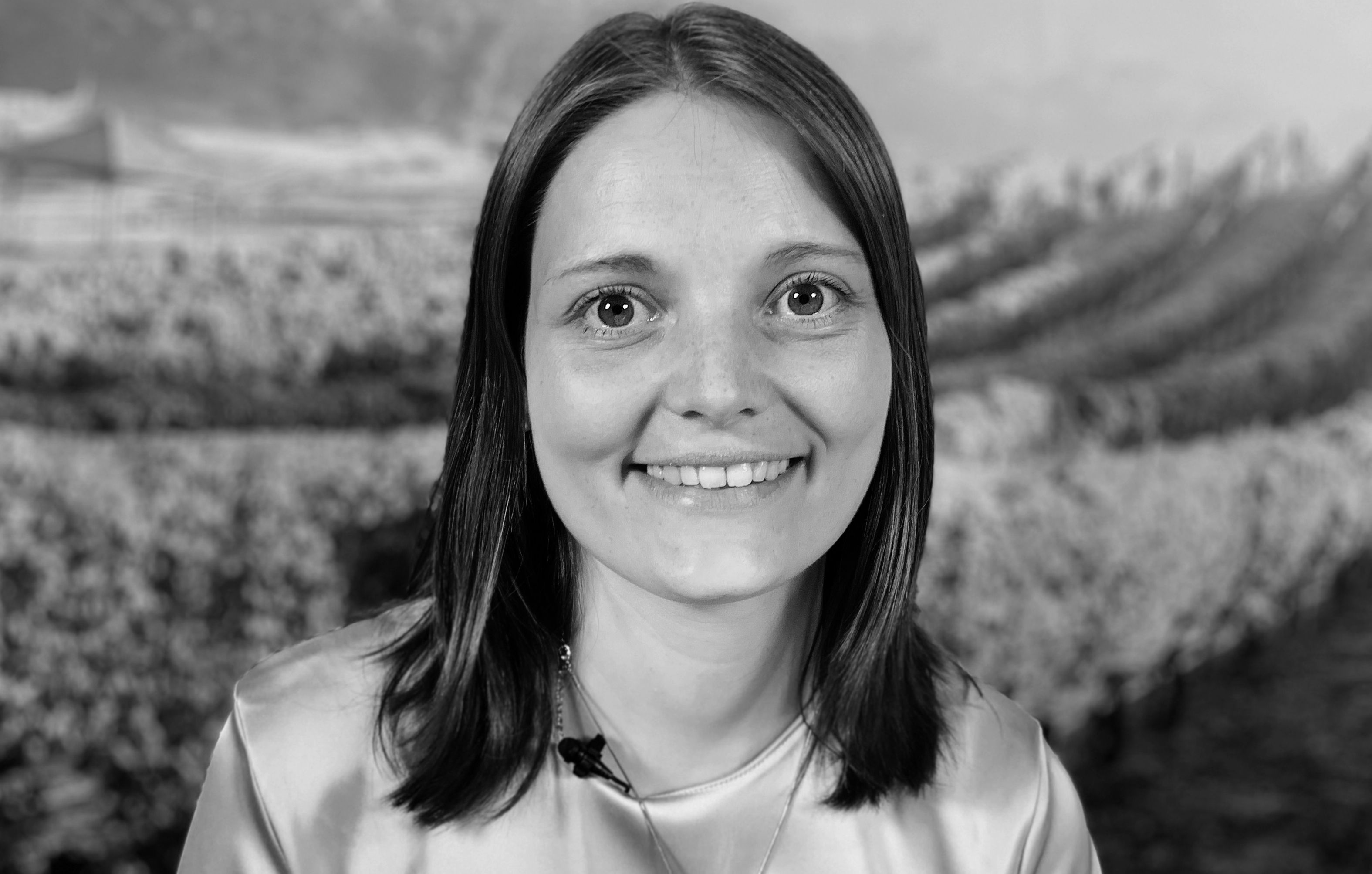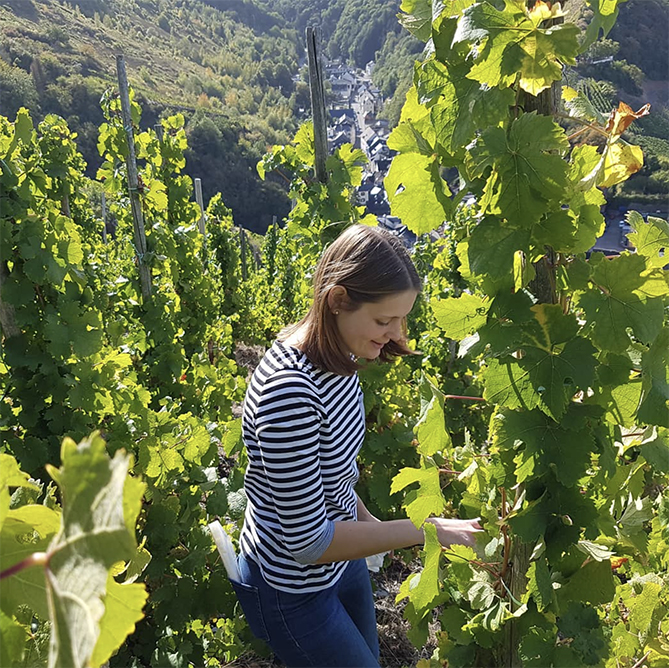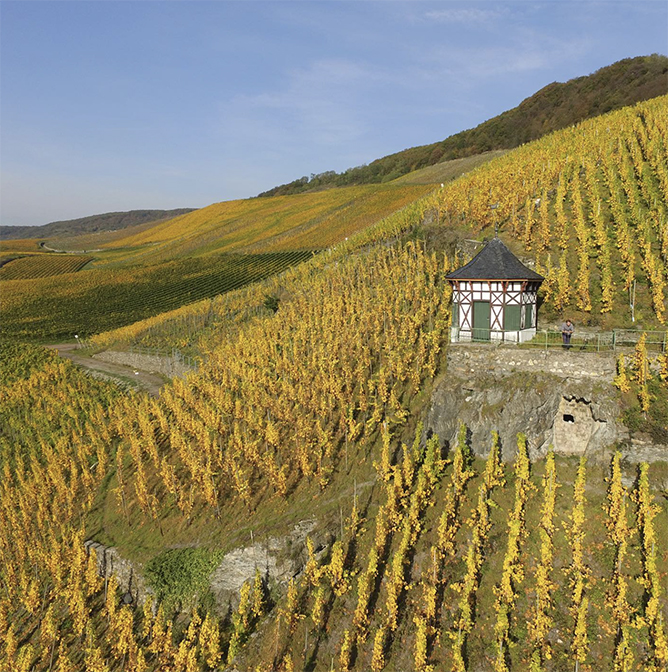The Witwe Dr. H. Thanisch winery is an esteemed estate in the Mosel wine region of Germany known for its centuries-long history of high-quality Riesling production. After Dr. Hugo Thanisch passed at an early age, his 29-year-old wife inherited the estate. "Witwe" translates to "widow" in German and the winery was then named after the widow: Witwe Dr. H. Thanisch. The estate gained its distinguished international reputation in the mid-1800s under the ownership of Dr. Hugo Thanisch. Since that time, Thanisch wines have continued to fetch impressive prices at international auctions.
The Mosel region is considered by many to be the best place for Riesling in the world. Many of the vineyards have a slope gradient of more than 60%. Manual labor is necessary all year round from the cultivation of the vines to harvest. The valuable combination of steep slopes, soil characteristics and climate presents the vines with the best possible conditions for development.
Grape Collective talks with fifth-generation owner Christina Thanisch about the history of the estate, the terroir of Mosel, and the different wines she produces.
Christina, talk a little bit about the history of your estate.
 Christina Thanisch: So we actually have a really long history in the estate, so it started in 1636. I'm the 12th generation in the family. And the special thing about our estate is that since 1895 the winery has been named after the widow of Dr. Hugo Thanisch.
Christina Thanisch: So we actually have a really long history in the estate, so it started in 1636. I'm the 12th generation in the family. And the special thing about our estate is that since 1895 the winery has been named after the widow of Dr. Hugo Thanisch.
(Christina Thanisch)
When my great-grandfather died at that time in 1895, his wife took over. She was 29 and had three children. And that was a really, really unusual time for women having a business. And that's why they named it after the widow of Dr. Thanisch. And the special thing is that since then, the estate always went into women’s hands. My mom is a fourth generation woman leading the estate, and I have the honor of being the fifth. So a really long family history.
And are there more women winemakers in Germany now?
In my generation, actually, quite a few. Especially when I was studying, there were a lot of women. But I think the special thing about us is the long history of women. Because in my generation it's normal, not like my mom's. We were just talking about how earlier in my mom's generation there weren't so many women, but now it's coming more and more.
Well, that's a good thing. Talk a little bit about the terroir, Christina, about the climate and the soils that you have in the Mosel.
So the Mosel is one of the most northern wine growing regions. So we still are a cool climate region and we have slate soils, so that brings a lot of minerality in the wines and for that soil and for our terroir. Riesling is just a really, really good grape because Mosel wine is always about great balance, especially if you have a little fruitier wines. The Mosel is really known for having the great slate soil and the acidity of the Riesling is always a really, really good match, that balance. So that's the most important thing.
What's the climate like?
We are getting warmer like everybody else. But I would say at the moment we are just having a little bit more profit from getting warmer in comparison to the other regions, because if you're looking back 30 or 40 years ago, it was really hard to produce a dry Riesling in the Mosel Valley because you just had too much acidity.
If you're tasting them now, like wines from the ‘80s, now they’re good, but you couldn't drink them at that time. And that's actually not a bad thing, but especially the dry wines are getting much better. But the weather extremes is what we have a problem with. So 2021 especially was a year where we had a lot of rain in summer in the Ahr Valley, we had huge floods where a lot of houses and vineyards that got destroyed.
We had a lot of water in 2021. And then we are looking back to 2022, we had one day of rain in July. It's just completely different and that's what makes it really complicated.
And talk a little bit about your philosophy of winemaking and viticulture.
 Our main important thing, especially in the cellar, is trying not to do a lot. When we pick the grapes, which are 100% hand-picked, we just bring the grapes into the winery, they get pressed, they fall down, then we do sedimentation, and then depending on the quantity we are doing, we put it in stainless steel or in wood barrels and then we just let the fermentation begin. The dry wines get a little bit of yeast and the rest is 100% spontaneous fermentation because we just like the individual character.
Our main important thing, especially in the cellar, is trying not to do a lot. When we pick the grapes, which are 100% hand-picked, we just bring the grapes into the winery, they get pressed, they fall down, then we do sedimentation, and then depending on the quantity we are doing, we put it in stainless steel or in wood barrels and then we just let the fermentation begin. The dry wines get a little bit of yeast and the rest is 100% spontaneous fermentation because we just like the individual character.
And from the vineyard work we have 98% from steep slopes. So it's a lot of handwork and we have some vineyards with wires so that you can do a little bit more machine work. We have a great team, especially for summer and for harvest time. Polish people are coming to help us, which is great to have.
And your farming philosophy?
We are not organic, but we just got a sustainability certificate. So yes, we are a really sustainable estate. So if you're looking back, we have 400 years of the winery, we have some vineyards which are 200 years old in our estate. So that's what is sustainable. But of course it's also really important looking at the economic and the ecological ways and at the social as well. And that's why we decided to have a certificate in sustainability this year.
And talk a little bit about the different wines that you make.
We are a member of the VDP so you always have the eagle on the capsule and the VDP has its own classification system. So the entry level is the estate wine. So that can come from all over the Mosel. Then we have the village wine, which has to come from one single town, which is really easy because we only have vineyards in Bernkastel in the town center and our most famous one outside is the Berncasteler Doctor vineyard.
But we also do the Bernkasteler Lay, Bernkasteler Graben, Bernkasteler Badstube so they are on the top and we produce Grosses Gewächs. So dry wines and also fruity wines are actually in every category. In the estate wines we do a dry but also an off-dry. In the village wines we do just dry and then in the single vineyards we also do Grosses Gewächs and also the fruity wines like Auslese and Spätlese which are really famous for the Mosel.
I'm always saying dry wines everybody can produce in Germany, but especially the fruity styles like Kabinett and Spätlese are unique in the Mosel Valley because we are just really cool. We have a lot of minerality and a lot of saltiness and it's just a little bit finer and elegant in comparison to other regions where you just have a little bit heavier soils and a little bit warmer climate.
We get the balance that you have of nice fruit and then the acidity, which is always balancing and the minerality of this slate soil. That brings especially for the fruity wine, a perfect character.
And how do you deal with vintage variation?
 We have such a small estate and I want it so one can taste the difference of the vintages. I'm in the estate since 2018 and actually every vintage was different. We had 2018 which was actually the warmest year we had in the last 20 years. So that was the earliest start of picking we ever had on the 17th of September.
We have such a small estate and I want it so one can taste the difference of the vintages. I'm in the estate since 2018 and actually every vintage was different. We had 2018 which was actually the warmest year we had in the last 20 years. So that was the earliest start of picking we ever had on the 17th of September.
It's late in comparison to other regions. But for us, middle September was really, really early. But it's a great vintage. It's just a little bit rounder but a really good vintage. And then we have 2019, which was really warm in summer, but then we had a cool harvest, so 2019 is concentrated fruit and nice acidity and then we have 2020, which I would say was the most normal year of these five.
And then we have 2021, which was extremely cool. That's more comparable with the '80s and '90s where you have a great acidity and it wasn't the ripest year. I know when I was standing in the cellar in 2021 and I was frustrated because we kept the vineyards, the grapes outside until the beginning of November, but the sugar level just stopped so nothing increased.
And so I was really frustrated because we can barely produce Auslese because it was just not ripe enough from the sugar level. But then my dad told me in the ‘80s and ‘90s, it was a great vintage. It's just a typical Mosel vintage. You have a little bit less residual sugar, you have a little bit less alcohol, but you have a lot of extract and that's a great vintage for keeping as well.
So I'm now really, really happy with 2021, but it was really difficult in harvest time because actually our younger generation, they didn't experience what we had from the years before, that some vintages cannot be as ripe. And then 2022 was really dry in summer, but then we had a lot of rain. So actually in August we were thinking that 2022 would be a hot and really alcoholic year with low acidity but then the rain came in September and October. We had 100 liters each. That changed the whole game.
2022 is again a cool vintage even if we have climate change. You see it's everything different and we want to show the vintage like it is. And so we don't add acidity or we lose it. You just keep it like it is. And every vintage is different and every customer can choose the vintage they prefer best. Some prefer more acidity, the others prefer it a little bit rounder.














